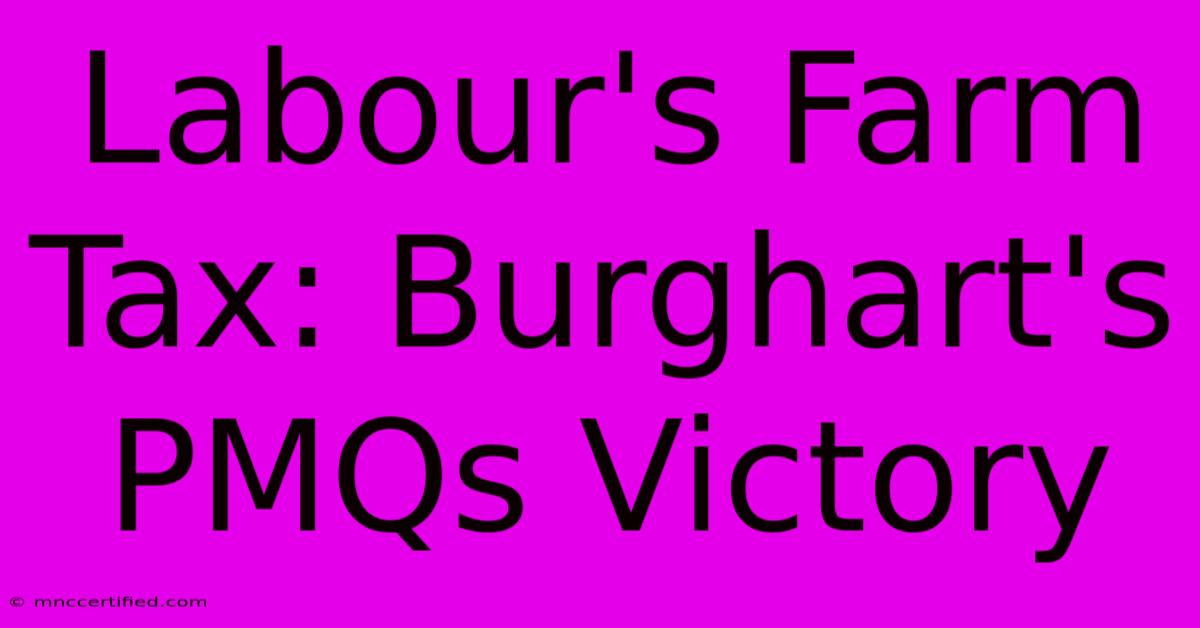Labour's Farm Tax: Burghart's PMQs Victory

Table of Contents
Labour's Farm Tax: Burghart's PMQs Victory – A Detailed Analysis
The recent Prime Minister's Questions (PMQs) witnessed a significant clash between Labour MP, Daniel Burghart, and the Prime Minister over Labour's proposed farm tax. Burghart skillfully pressed the government on the details and potential impact of this policy, securing what many consider a victory for the Labour party. This article delves into the specifics of the proposed tax, Burghart's compelling arguments, the government's response, and the wider implications for the agricultural sector and the upcoming election.
Understanding Labour's Proposed Farm Tax
Labour's proposed tax on large agricultural estates has been a central point of contention in the recent political discourse. While details remain somewhat fluid, the core principle revolves around taxing the significant landholdings of wealthy landowners, often criticized for contributing minimally to food production. This differs from a general land tax which could impact smaller farmers. The proposed tax specifically targets those deemed to be utilizing their land for non-productive purposes, such as simply holding it as an asset rather than actively farming it.
Key Aspects of the Proposal:
- Targeting large landowners: The policy isn't aimed at small family farms or those actively engaged in sustainable agricultural practices. Instead, it focuses on vast estates often owned by corporations or wealthy individuals.
- Environmental considerations: Labour argues the tax incentivizes more sustainable land use, potentially encouraging rewilding projects or promoting more efficient farming practices to maximize tax benefits.
- Revenue generation: The tax is projected to generate substantial revenue, which Labour intends to reinvest in supporting smaller farms and promoting sustainable agriculture. This represents a key policy divergence from the current government's approach.
Burghart's PMQs Performance: A Masterclass in Questioning
During PMQs, Burghart expertly exploited weaknesses in the government's defense of its agricultural policies. He highlighted the lack of transparency surrounding government support for large landowners, contrasting it with Labour's commitment to supporting smaller, more sustainable farms. His pointed questions exposed apparent contradictions in the government's claims, forcing the Prime Minister onto the defensive. He successfully framed the debate around fairness and environmental responsibility, resonating with a broader audience concerned about both issues.
Burghart's Key Arguments:
- Inequity in land ownership: Burghart emphasized the disproportionate concentration of land ownership in the hands of a few, arguing this undermines fair competition and prevents the growth of smaller, more sustainable farms.
- Lack of accountability: He pressed the Prime Minister on the lack of accountability for large landowners receiving significant government subsidies without demonstrating commensurate levels of agricultural production.
- Environmental impact: Burghart linked the concentration of land ownership to environmental degradation, highlighting the potential benefits of a tax in encouraging more environmentally friendly land use.
The Government's Response: Weaknesses Exposed
The government's response to Burghart's questions appeared hesitant and unconvincing. They struggled to provide concrete evidence to counter Labour's claims about the inequities in land ownership and the lack of accountability surrounding government subsidies. This lack of a robust response further strengthened the perception of a Labour victory in the PMQs exchange. The government’s attempts to deflect the criticism by focusing on broader economic issues fell flat, failing to address the core arguments raised by Burghart.
Implications for the Agricultural Sector and the Upcoming Election
Burghart's success at PMQs carries significant implications for both the agricultural sector and the upcoming election. The debate surrounding Labour's proposed farm tax has raised crucial questions about fairness, sustainability, and the role of government support in agriculture. This policy debate is likely to influence the voting intentions of environmentally conscious voters and those concerned about rural economic inequality. The government will likely need to refine its messaging and policies regarding agricultural support to address the concerns raised by Burghart and gain traction on this important issue.
Conclusion: A Turning Point in the Agricultural Policy Debate?
Daniel Burghart's performance at PMQs represents a notable success for the Labour party, highlighting weaknesses in the government's approach to agricultural policy. Labour's proposed farm tax, though still needing detailed clarification, has successfully captured public attention and fueled a crucial debate about the future of farming and land ownership in the country. This victory could mark a turning point in the agricultural policy debate, setting the stage for further scrutiny of government subsidies and prompting a wider conversation about the need for more sustainable and equitable land use practices. The upcoming election will undoubtedly see this issue take center stage.

Thank you for visiting our website wich cover about Labour's Farm Tax: Burghart's PMQs Victory. We hope the information provided has been useful to you. Feel free to contact us if you have any questions or need further assistance. See you next time and dont miss to bookmark.
Featured Posts
-
Shelter Insurance Waynesville Mo
Nov 22, 2024
-
Oura Ring Review Improved Mindfulness
Nov 22, 2024
-
Icc Seeks Arrest Of Israeli Hamas Leaders
Nov 22, 2024
-
Bed And Breakfast Insurance Cost
Nov 22, 2024
-
Incoming President Gets Intelligence Briefings
Nov 22, 2024